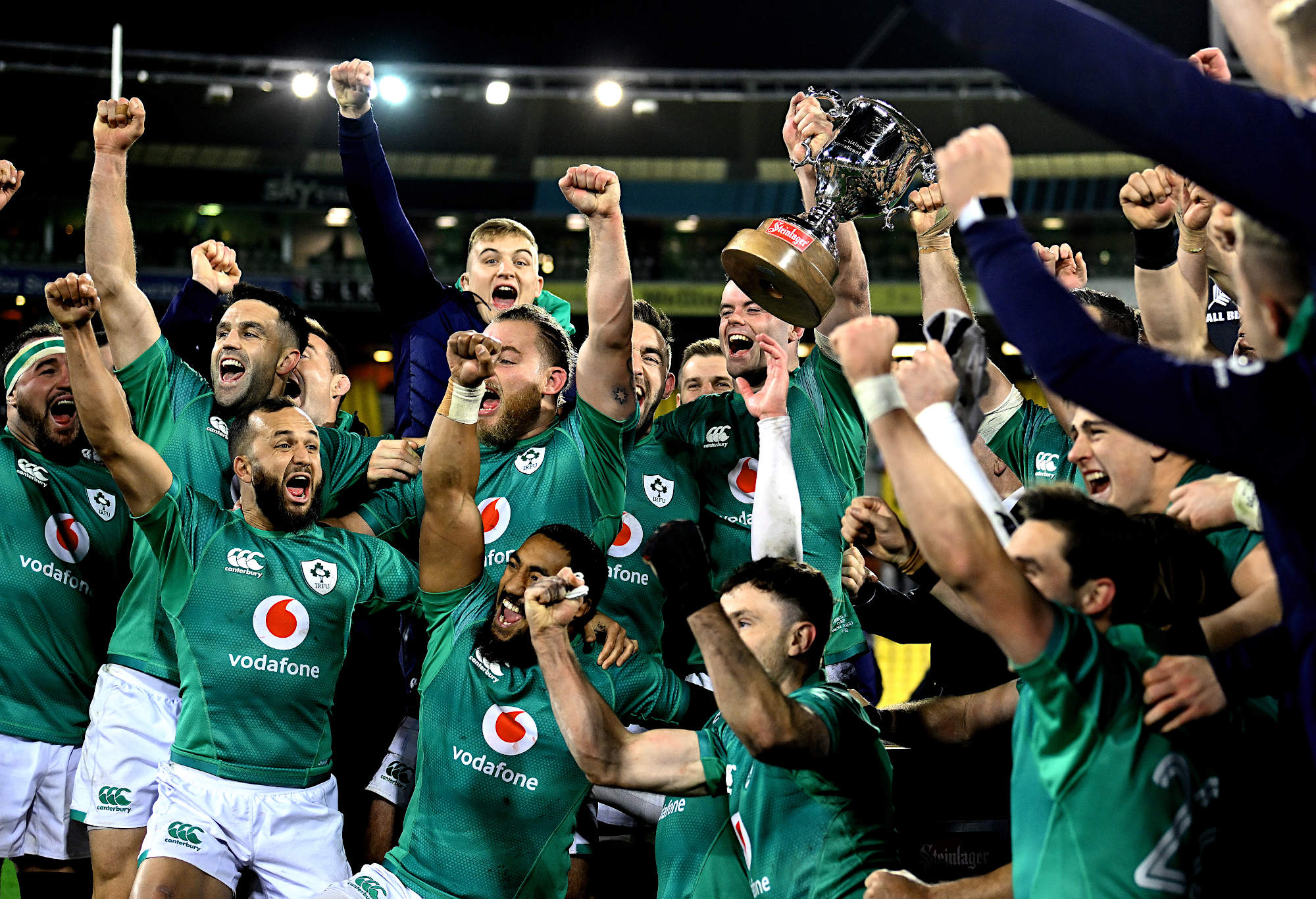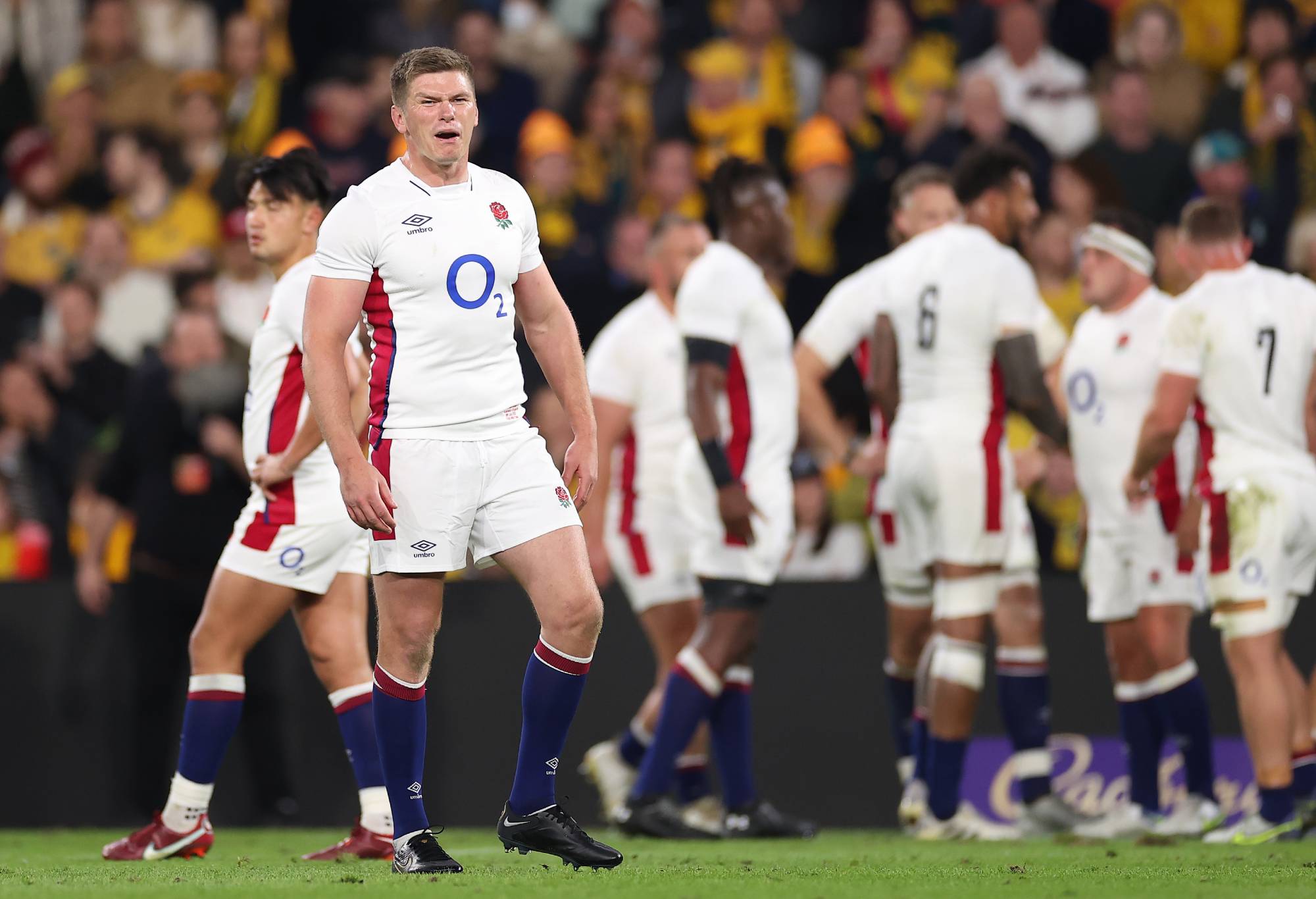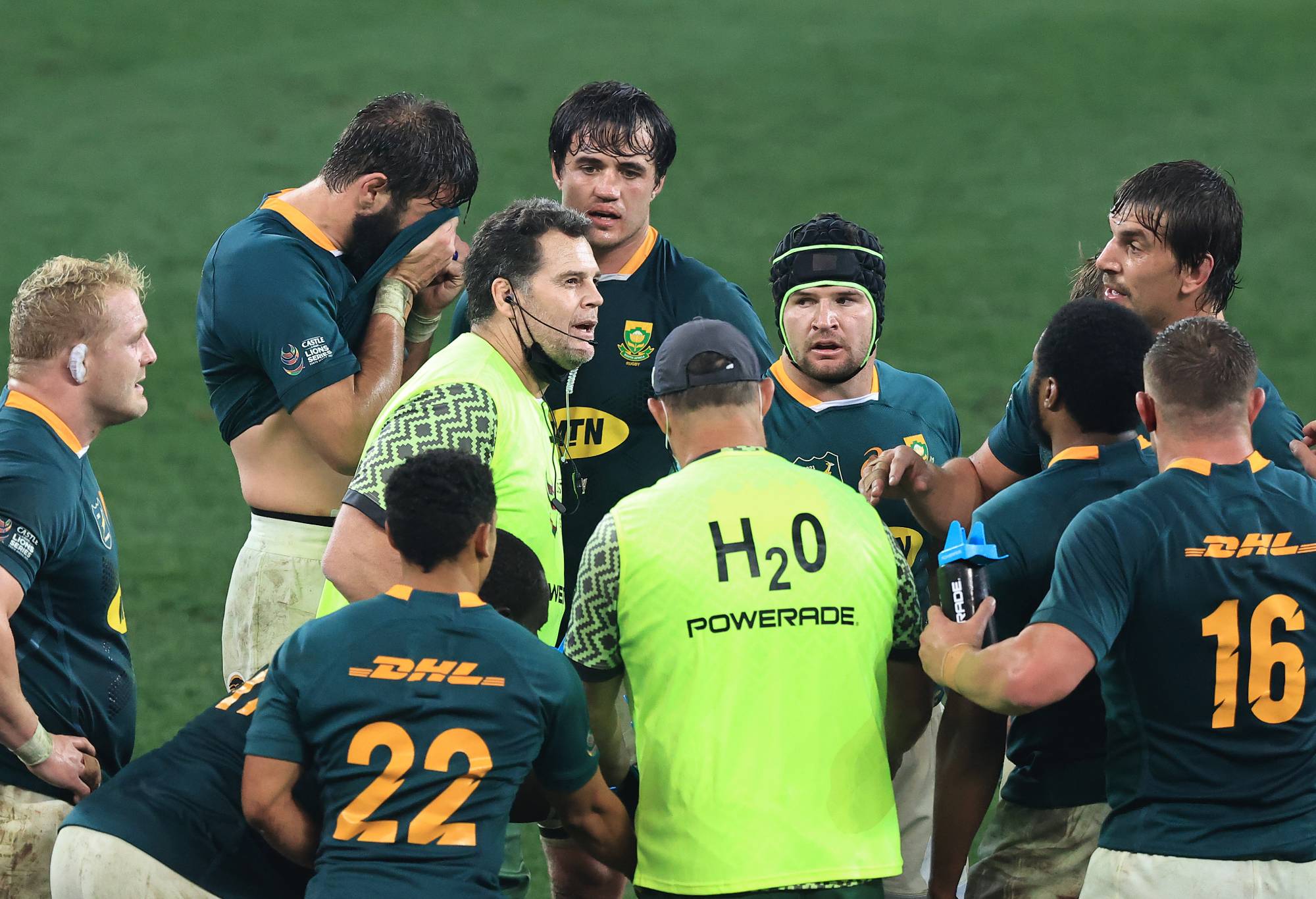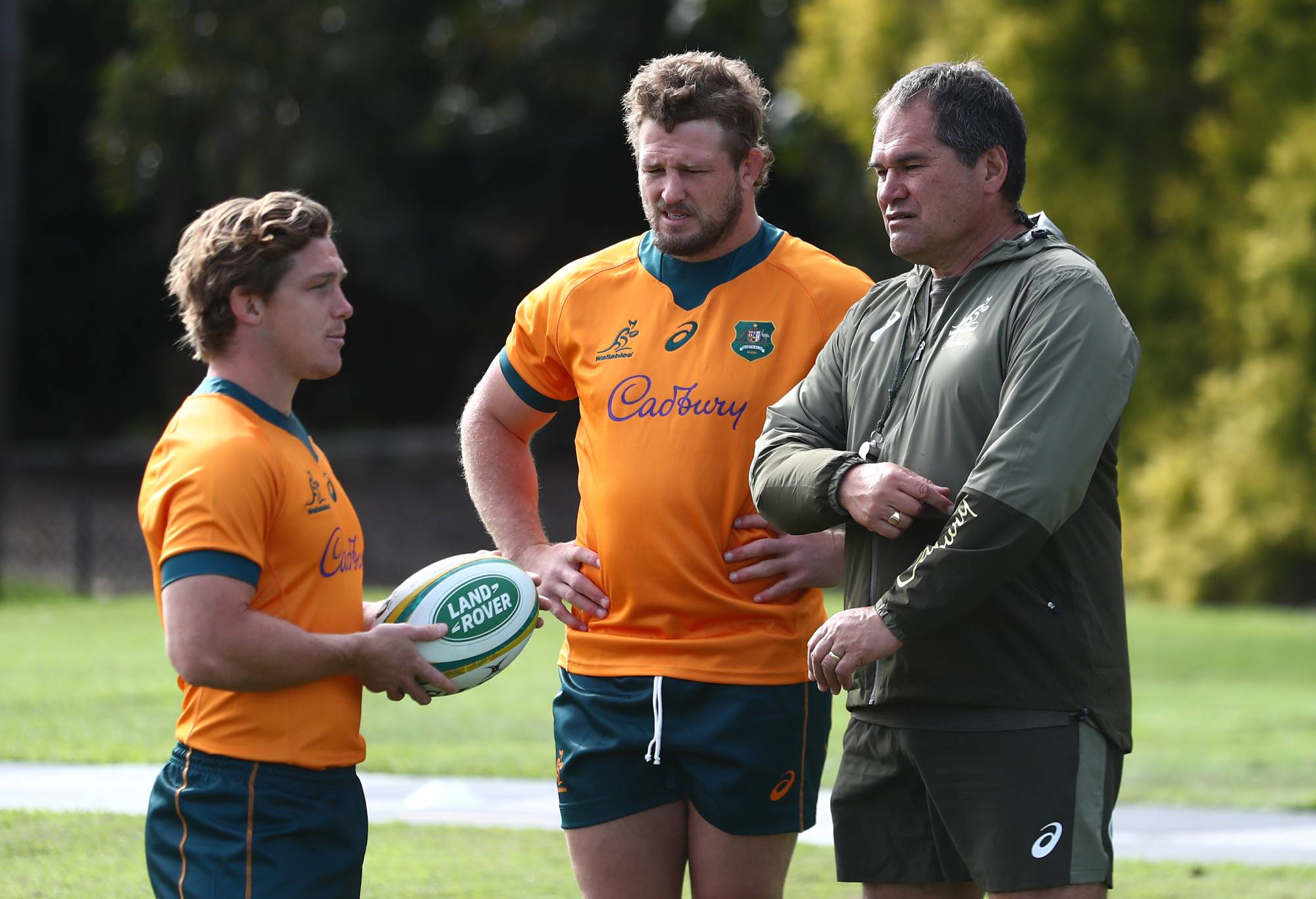The four chief antagonists of the south journey north this autumn with seasons in the balance.
Their head men are a fascinating spectrum of competitive spirits.
A thin-skinned Kiwi still smarting from national angst and critique, who has ceded pockets of pack power to Alpha assistants; he may feel vindicated, but All Black pundits and fans need more. Another dour New Zealander is on a collision course with a ‘worst season ever’ title, clinging to injury reports as an alibi.
A fiery Lebanese-Australian change artist with a swagger born of the best Puma season in The Rugby Championship. Two methodical South African coaches, who play at the extreme ends of the volume switch, are plotting 2023 as a redux to 2019, presenting as careful planners, but wildly and intermittently reckless.
The northern autumn is rugby’s true winter. Literally in Scotland, where the proverb goes: “Cast not a clout till May be oot.” Or “Don’t discard your winter clothing until May.” A corollary would be to get the long underwear out of storage in October. In 2018 at Murrayfield, I welcomed the fireworks mostly as warmth.
But figuratively the End of Year Tour poses as tragic epilogue. William Shakespeare’s Sonnet 5 lamented:
“For never-resting time leads summer on
To hideous winter and confounds him there;
Sap cheque’d with frost and lusty leaves quite gone,
Beauty o’ersnow’d and bareness every where.”
Gone are the prospects and happy thoughts of May. June laid waste to the rugby citadels of New Zealand and resurrected English smiles Down Under. The latest Welsh wizard of the breakdown, Leicester’s jackballer Tommy Reffell, made his grand appearance in South Africa. Only Argentina loves 2022 so far.
Dave Rennie’s final chapter as Wallaby coach may begin in cold Scotland, a place he knows quite well. Southern rugby players have reached Edinburgh, Paris, Dublin, and London lately sapped of strength and, in the Wallabies’ case, left barren on the scoreboard, and quiet in the changeroom, even in Cardiff.
Surely not in Florence?
Snapshot of the tours (World Rugby rankings of foes):
No. 3 South Africa: Plays Nos. 1, 2, 14 and 5 in order
No. 4 New Zealand: 10, 7, 6 and 5
No. 8 Argentina: 5, 7 and 6
No. 9 Australia: 6, 2, 14, 1, and 7
Each team has drawn two referees from the Northern Hemisphere. Australia (2 NH, 3 SH). The Southern Hemisphere refs who have made the cut are Ben O’Keeffe, Brendon Pickerill and Jaco Peyper (Australia vs. Ireland, Italy and France, respectively, as well as Argentina vs. Wales), Angus Gardner (South Africa vs. England) and Nic Berry (New Zealand v. England). Tiresome as it may be, their names and decisions will be as certainly and nebulously debated as deep questions like “when and how did matter become conscious” and “are IPAs utterly pelican pretentious or utterly essential?”
The least settled team has given itself the most difficult journey, scheduling only one match as a favourite. The iron men of Argentina face the most fitting tour for their position at the moment: a 3-game series including two likely Rugby World Cup foes England and Wales but skipping Ireland and France. The All Blacks have the easiest path, dodging the two top dogs and beginning with Japan before tackling Wales.
The Springboks jump right into the fire: Dublin-Paris on weeks 1 and 2. But as Bok coach Pieter de Villiers once mused: “If you want to run with the big dogs you’ve got to lift a leg.” (And that was before a shock win in Wellington).
2022 records in brief
South Africa: W6 L3 (average score: 26-16)
New Zealand: W5 L4 (30-19)
Argentina: W4 L5 (23-28)
Australia W3 L6 (23-31)
Best 2022 wins
South Africa: A stifling 26-10 victory over New Zealand in Mbombela; comprehensive 24-8 in Sydney.
New Zealand: The 53-3 runaway from Argentina in Hamilton; the 40-14 Wallaby spanking in Auckland.
Argentina: An historic 25-18 triumph in Christchurch; the seven-try 48-17 stampede in San Juan.
Australia: Adelaide’s defensive and counterattacking masterpiece over world champion South Africa.
Most concerning losses
South Africa: Ellis Park. 72 minutes – The Boks lead and enter the 14-man All Blacks’ 22. Lose by 12.
New Zealand: Dunedin, Wellington, Mbombela, Christchurch. Three at home. One totally defanged.
Argentina: Blacklash in Hamilton and two undisciplined losses at the end (16 and 17-point margins).
Australia: The decider to England, a San Juan capitulation, Sydney’s surrender, and the last (14-40).
What awaits them?
Ireland
Ireland’s campaign in New Zealand is the big story of the Test year so far and is unlikely to be eclipsed. They won back-to-back to claim a series in the hardest place to win. Put that together with a Six Nations where they scored and defended better than France (Ireland scored 24 tries and conceded 4; France was 17-7), lost only narrowly when Johnny Sexton was absent in Paris, and are not missing nearly as many players as France; perhaps Dublin is the new Auckland.
A number one rugby team should never lose a Test in their fortress. And yet, one cannot help feeling the souls of Irishmen past, reminding us that to be Irish is to know in the end your heart will be broken. It just all seems too good to be true. What if the Boks bludgeon their way to a win on November 5 and Australia sneaks a win later in the series? The ancient poetry of defeatism will spill out of loose Limerick lips.

(Photo by Joe Allison/Getty Images)
“All Moanday, Tearday, Wailsday, Thumpsday, Frightday, Shatterday,” wrote James Joyce. He even found a way to besmirch the ocean: “The sea, the snotgreen sea, the scrotumtightening sea” in Ulysses.
There is no deep optimism in Ireland; merely a long and dreaded wait for guilty punishment for sins not even fully committed. But the bookmakers may force upon them a cockiness not deeply felt. Their short passing game is better than the All Blacks, their lineout superior to the Boks, their fitness ahead of Wales, and their coaching group even more devious than France’s.
The Boks and Wallabies should lose in Dublin; any other outcome is a hammer blow to the North. I’ll be there for my first Test match at the Aviva, and doing an instant reaction after the game in Paris. Stay tuned.
France
GOAT French flanker Jean-Pierre Rives invented the blood bin. He is also a quote machine, perfectly evoking his nation’s relationship with the sport. “Art. Sculpture is just invention and energy, and rugby is energy too, and invention sometimes,” said he. Also, “The whole point of rugby is that it is, first and foremost, a state of mind, a spirit.”
This belies the techne beneath. Galthie and his defensive wizard Shaun Edwards have created patterns on the pitch which make life extraordinarily difficult for opponents.
The French are still French, however. Their best and most powerful figures are in the dock, on trial for corruption: owners, administrators, beloved godfathers. Their casual attitude towards conditioning is also on display: having skipped a tough tour south and with domestic rugby chewing up players every week, they may not have a fit and firing team.
However, they are not the number two team by mistake. They should win all their Tests. They must.
If they lose to South Africa, it will be a problem. If they lose to the Wallabies, it will be a crisis.
The French press is next level from any other rugby country: it will be a deafening negativity and never underestimate their ability to form a circular firing squad.
I have been to many a match in Paris and it is one or the other: a deafening jubilee of wild passion, or the worst place for the French to play, with whistles and jeers and boos at their own team.
2022 has seen unexpected things: why not an upset?
England
I went to Twickenham to see Ireland play England and came away thinking it is not the ideal fortress. The fans require some sort of outrage to really focus. Arm patches and cranberry chinos draw more attention.
England’s ranking seemed built on sand. Eddie Jones’s team won twice in the Six Nations (with an inferior tries scored-conceded even than Wales) and won twice against an inconsistent Wallaby side. That is about it.
Jones is always verbal. Here he is touting his squad, which does not include Henry Slade. “This is a very strong, vibrant squad and a number of good players have been left out. We are pleased with the depth and the strength of the squad. The autumn internationals will be like a mini World Cup for us, starting with two tough games against Argentina and Japan which mirrors our pool fixtures at next year’s tournament.”
As has been the case for a while now, midfield is an issue. Will Joseph, Guy Porter, often-injured Manu Tuilagi and Owen Farrell are the recognised centres. Marcus Smith is not in top form, so Farrell may return to his best position.

Owen Farrell. (Photo by Cameron Spencer/Getty Images)
Prop Kyle Sinckler is back with a better back. Ben Youngs, too; meaning Danny Care may really be retired. Harlequins wing Cadan Murley, who has been tearing it up and called the Cheslin Kolbe of the north, is the newbie in the backs.
Max Malins and Raffi Quirke made the cut. Elliot Daly has not; despite excellent form for Saracens. Neither has Joe Marchant, who was not at his best in Australia. Anthony Watson is missing, as is Joe Marler.
Alex Coles is in over Joe Launchbury. West Country scrum monster Val Rapava-Ruskin of Gloucester is named in the front row.
Jones is immune at RFU, but one would think dropping both matches to New Zealand and South Africa would put a damp cloth on all his pronouncements.
Wales
Wayne Pivac has a good team. Just look at it on paper. Wales can put a 1,000 cap team on the field with 10 Lions. The problem is the game is not played on paper.
Wales needs wins. They will always be a tough out in the World Cup, where the draw puts them on the Argentine, English, Australian side. Thus, wins over Argentina and Australia shape as confidence boosts.
If they can stop getting blown out by the Kiwis, things will look better.
Cardiff is one of the best places I have been to watch rugby: this is worth the tour alone.
Scotland
The Scots do not set targets. It would involve some sort of money outlay.
But in all seriousness, they will circle the 29 October Wallabies fixture as their first bellwether and a ‘revenge’ match against the Pumas on 29 November as a benchmark of where they are. Win both and it will be a good end.
What Does Each SH Team Need from the Autumn Series?
South Africa is a side who knows how it wants to play. Defence as attack. Yes, more backs scored tries than forwards, but not many from long phase play, nor even from first phase design. Forward dominance allowed the Boks plenty of time in opponents’ red zones, but efficiency lagged the other top squads.
Ireland and France have better tight fives than the Pumas and Wallabies. So, this will be a better examination of where Siya Kolisi’s packmates Malcolm Marx, Steven Kitshoff, Eben Etzebeth, Lood de Jager, Pieter-Steph du Toit and Frans Malherbe are sitting in the world game. In particular, the Test in Paris would seem to be just what Fabien Galthie and Jacques Nienaber want: a gauge of true power.
Conceding an average of 16.5 points per game with an unusually high number of clean breaks up the middle or kick-passes on the edge was not ideal, but Nienaber still has the best defensive team in the world. Only one opponent (New Zealand) has notched thirty or more points against the Boks in 2022. South Africa will be happy to hold France and Ireland under three tries and 25 points per Test.
All Bok Nation eyes will be on No.10. This was not supposed to be the story of this year. Handre Pollard’s meniscus and Elton Jantjies’ missus have thrown the calculations of Rassie Erasmus and his mate Nienaber overboard.

(Photo by David Rogers/Getty Images)
They wanted to baptize young Jaden Hendrickse as the crucial nine in their kicking system, with the benefit of seasoned operators at flyhalf. Hendrickse indeed seized and kept the jersey from Faf de Klerk (who may even fall further if Cobus Reinach or another of the talented group of Saffa halfbacks tour well, given that midweek matches against Bristol and Munster offer more game time).
Damian Willemse was the other important, planned move of the Bok 2022, but not at flyhalf. ‘Gazza’ was seen as the heir apparent to Willie le Roux, who would merely supplant aging Frans Steyn as Player 23 for France. Gazza (24) plays centre and fullback for the Stormers but can ignite the red zone attack as first receiver. Again, the experiment worked. Le Roux slipped seamlessly, if a bit grumpily, into utility reserve.
But then, Pollard’s knee and Jantjies’ joint went awry, and Gazza pulled the strings at the Allianz christening and in the 36-20 win in Argentina with aplomb. Without the hundred-plus caps of Pollard and Jantjies, the Boks went 3-0 (even if the last win was despite the great but weighed-down Frans Steyn instead of because of him). Willemse’s work off the tee is not up to Test standard, yet, but he has unshakable confidence in every other part of his game and can likely improve at goalkicking given the purity of his strike.
With Leicester saying Pollard is likely out for six weeks, this tour takes on an intriguing opportunity for Johan Goosen, one of South Africa’s most naturally gifted playmakers in this century, but plagued by injury and contract disputes, to show at age 30 what he promised at age 20 on debut.
Home-based flyhalves Manie Libbok of URC champion Stormers (see his perfect strikes in pouring rain at the Ospreys) and Gianni Lombard may be the frontrunners to go on tour, just ahead of the Sharks Boeta Chamberlain, Bulls Chris Smith, and wunderkind and Baby Boks captain Sacha Mngomezulu (20), who may have the highest upside of them all.
Solve the understudy-ten question, take Ireland and France to the wire, and win over Italy and England, and the Boks will have a passing grade at 8-5 for the season and likely still number three. Topple one or two and it will be a good season with 9 wins, youth blooded, continuity cemented, and a top two ranking. Sweep and a 10-win South Africa could even “win the season.”
Strengths: Stingy defence, continuity, experiments worked, and stocked with NH-based players.
Weaknesses: Thin at ten, a few overplayed (Jasper Wiese, Etzebeth), and a stale red zone attack.
Under the pump: Backline coach Mzwandile Stick, he of the Sevens background, trying to find 7 points.
New Zealand
New Zealand is not an operatic nation, except for rugby. This year was full on melodrama.
Go back in time. The Kiwis had given up a series to Ireland in Wellington, losing by ten. Over to Nelspruit and with a couple of minutes left, they were down 26-3 to the old enemy, and just trying to score a consolation try. Things were as bad as anyone could remember. Foster was being equated with real villains. John Hart’s name was invoked on the hour. Longtime friends and coaches were sacked to spare the leader.
The only player exempt from savagery was Ardie Savea, who was a one-man band through Test No. 4.
The nadir was then. Ellis Park saved the chief. But things did not actually get that much better, in terms of traditional All Black history, because Christchurch put the fans in a whiplash mode. It was after that, in Hamilton, Melbourne, and Auckland, that a modicum of normalcy was restored.
It all started up front.
Samisoni Taukei’aho, Waikato hero, aged 25 and about 15 caps, joined with 24 year-old Southland strongman Ethan de Groot (less than 10 caps when the renaissance began) and 26 year-old Tyrel Lomax to stop the bleeding in the frontline. Rookie Fletcher Newell of Canterbury also made big waves. Behind them a mighty 300-cap axis of Brodie Retallick, Scott Barrett and Sam Whitelock refused to give an inch.
The tight five saved the season. Yes, Richie Mo’unga and Jordie Barrett did their part, but it started up front.
Foster and his empowered selectors look across a Japan-Wales-Scotland-England tour and probably see a 9-4 season taking shape. Their squad is greatly boosted by the return of clever 56-Test midfielder Anton Lienert-Brown back from shoulder surgery, along with Braydon Ennor in the midfield after injuries to Quinn Tupaea and Jack Goodhue. Finlay Christie and Folau Fakatava are retained as Aaron Smith’s mates.
The rest is standard fare, with low minutes Blues men Stephen Perofeta and Roger Tuivasa-Sheck likely getting more of a chance. This is a veteran squad: 1,362 Test caps. The most notable omission is Pita Gus Sowakula. He was one of the best players in Super Rugby Pacific. But now he has missed out on both the All Blacks’ squad and the supplemental side, meaning the selectors found 63 men better at rugby in 2022?
He could have played for Fiji in his prime (27), but now has to wait till he is 30 if the snub is permanent.
Strengths: Selection. Scoring. The All Blacks have remembered how to score in bunches, quickly.
Weaknesses: Defence in close to mid-channels (England will try to exploit). Midfield continuity.
Under the pump: Ian Foster, even now. Picture two losses (to Wales and England or plucky Scotland).
Argentina
Michael Cheika has a good tour lined up. His overplayed pack core (Julian Montoya, Tomas Lavanini, Guido Petti, Matias Alemanno, Pablo Matera, and Marcos Kremer) needs a rest. England-Wales-Scotland is perfect: a series with decreasing physicality.
The logistics of getting a Test squad together with enough time to gel is the main issue for Los Pumas.
But no team in the world is better practiced at it than Argentina.
Strengths: Growing confidence due to wins over New Zealand and Australia. A superb loose trio.
Weaknesses: Discipline. Field position: they are not entering the 22 enough. Once there, they do well.
Under the pump: The team just has to avoid getting on the wrong side of the whistle: Andrew Brace, Ben O’Keeffe, and Karl Dickson are no-nonsense refs.
Australia
The return of Michael Hooper is the first big story. On our podcast, James Slipper said it would be up to Hooper to take back the captaincy. Rennie said it was his and the selectors’ call. When he stepped down, he cited “mindset” issues. Even before then, I wrote that he needed to just play and hand over that duty to someone else. He did not look happy. So, from a 121-cap flank to a 123-cap prop, the baton remains passed.
The Wallabies have decided to devise a tour from hell, or into hell. Five weeks straight.
Along with the veterans, Ben Donaldson, Mark Nawaqanitawase, Jock Campbell and Langi Gleeson have been thrown in the mix. Gleeson is the ‘it’ lad. 21, tall, strong, and the fastest man over 40 metres in the Waratahs squad. Another big athlete, Ned Hanigan, is back in the camp after two years gone; he is the target of many criticisms, but he has gotten stronger.
Angus Bell is replaced by the rather soft Tom Robertson, who may face a severe examination in the North.
Only two players are chosen under the Giteau Law, with La Rochelle’s mammoth Will Skelton and Japan-based fly-half Bernard ‘Time is Off’ Foley on the plane. Here, Rennie seems to have missed a trick.

Head Coach Dave Rennie, Michael Hooper and James Slipper. (Photo by Chris Hyde/Getty Images)
A five-match tour of the UK, Ireland and France, with the likes of Hanigan, Robertson, Nick Frost, Cadeyrn Neville, and Jed Holloway as your ballast and engine room is a bit concerning.
Skelton is no easy lift in the lineout. Philip could be missed.
Who will battle the Paul Willemses, Maro Itojes, Will Rowlands, and Scottish Grays at lineout?
Perhaps the most intriguing choice is at fullback: Tom Banks, Jordan Petaia, Andrew Kellaway and Campbell are in a battle royale.
Rennie says: “We’ve got a massive opportunity over the next five matches to test ourselves against some of the best teams in the world and string together some performances that our supporters are proud of back home in Australia.”
But the only ‘sure’ win is over Italy.
If he adds three or four more losses, Rennie is looking at a 10-loss season.
Strengths: Low expectations. Loose forward talent. Clever nines. Ability to score quickly.
Weaknesses: Inability to hold the ball for long periods. A weak second row. Uncertain playmaking.
Under the pump: Rennie. Foley. Slipper. Hooper. Any fullback who starts.
































































































